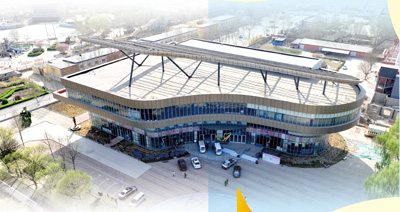County in N China's Hebei thrives on music
Home to over 60 musical instrument manufacturing enterprises, Wuqiang county in Hengshui city, north China's Hebei Province is an important exporter of musical instruments in China.

A worker assembles a saxophone at a factory of the Jinyin Group in Wuqiang county, Hengshui city, north China's Hebei Province. (Photo/Su Xiaoli)
In Zhouwo village, which is less than 10 kilometers away from the county seat of Wuqiang, elements of music and art can be found everywhere, including a giant violin sculpture, piano music played on a loudspeaker, piano and guitar paintings on walls, and roads and drum-shaped dustbins.
"We are a small village filled with a rich artistic atmosphere," said Zhou Zhixue, head of the villagers' committee in Zhouwo village, who added that one third of the village's residents work in musical instrument factories.
In the 1980s, Chen Xuekong, a villager in Zhouwo, returned to the village with musical instrument manufacturing skills he had learned elsewhere. He and another villager established the first musical instrument factory in the county.
Chen invited technicians from musical instrument factories in big cities to teach techniques to local villagers. At first, the villagers made musical instrument models using midribs of Chinese cabbages and carrots. After practicing for several months, the farmers became skilled workers, with products they made being sold to cities across the country and winning recognition.
The musical instrument factory, now called the Jinyin Group, is a manufacturer of medium- and high-end products and has gradually entered the global market.
The Jinyin Group produces more than 100 types of musical instruments, including woodwind instruments, brass instruments, the violin family and the guitar family. The company's annual output of Western wind instruments hit 1 million, achieving an annual output value of 426 million yuan ($58.9 million).
"However, due to backward facilities, many clients were pessimistic about the prospects of musical instrument manufacturing in the village and local companies couldn't retain talent," said Chen.

A global musical instrument museum located in a music town in Zhouwo village, Wuqiang county, Hengshui city, north China's Hebei Province. (Photo/Zhao Hongchao)
To solve this problem, Hengshui city and Wuqiang county decided to expand the industrial chain by incorporating music into people's lives and building a music town that produces musical instruments and serves as a scenic area.
In 2012, a music town was built in Zhouwo village. The music town has over 80 buildings used to develop businesses such as B&B hotels, coffeehouses, and musical instrument experience centers.
A music experience center and a world musical instrument museum in the music town are open to college students and teachers, industry insiders and film and television production companies from home and abroad.
In July 2022, Zhouwo village was rated as a national 4A scenic area in China.
In 2022, the operating revenue of the musical instrument industry in Wuqiang county reached 1.91 billion yuan, an increase of 18.7 percent year on year.

Tourists play musical instruments in a music town in Zhouwo village, Wuqiang county, Hengshui city, north China's Hebei Province. (Photo/Su Xiaoli)
In recent years, the music town has held many cultural exchange events, including guitar festivals, music festivals and outdoor concerts, which were participated in by nationally and internationally renowned musicians, singers and bands.
Before he was 40, Han Qiang, the owner of a musical instrument store in the music town, was a farmer. Han cultivated an interest in the guitar when he was a construction worker working for the renovation project of Zhouwo village. He turned into a salesperson and a guitarist at a guitar store in the music town after he turned 40.
"Sometimes I can sell three to four guitars and violins a day and earn 70,000 yuan a year," said Han.
The annual per capita income of residents in Zhouwo village has grown to 25,000 yuan today from more than 3,000 yuan before the music town was built. Six nearby villages have developed thanks to the music town.
"Going forward, we will develop a richer variety of business forms in the music town, attract investments and develop weekend tourism," said Liu Mo, chairman of the board of directors of a culture and tourism development company in Wuqiang.
Today, there are 63 musical instrument manufacturing companies in Wuqiang and over 10,000 people are engaged in the industry.
The seeds of music have begun taking root in the hearts of local people in Wuqiang. The local government has distributed more than 1,200 musical instruments to local schools, trained more than 140 full-time and part-time music teachers, and started introducing musical instruments in 15 schools, which sees the participation of more than 10,000 students.
Photos
Related Stories
- 2023 Fest To Go music festival kicks off in Hohhot, N China
- Artist blends traditional Chinese Jinghu music with modern sounds
- Chinese, U.S. musicians jointly stage music festival in New York
- Piano-guzheng ensemble combines charms of different cultures
- Flutist showcases Taiwan region nose flute on reality show
Copyright © 2023 People's Daily Online. All Rights Reserved.









